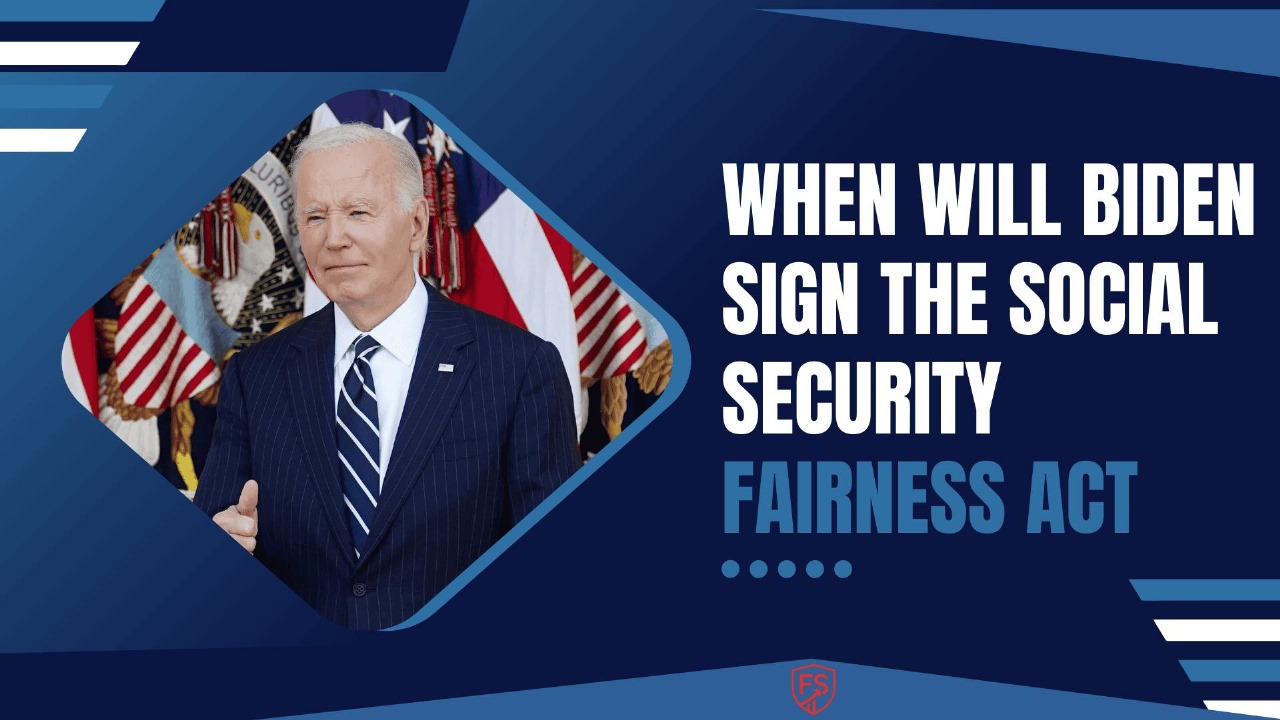When Will Biden Sign the Social Security Fairness Act is a question that keeps popping up in conversations, news articles, and especially among retirees and public service workers.
I’ll be honest, I’ve asked myself the same thing countless times because like many of you, I have family members who are affected by the Windfall Elimination Provision (WEP) and the Government Pension Offset (GPO).
The anxiety around Social Security benefits is real. People want to know if their years of hard work as teachers, firefighters, or police officers will finally be recognized fairly in the retirement system.
And the truth is, while everyone is waiting for President Biden’s signature, the reality is that the signing can only happen after Congress takes action. Let’s walk through where things stand, what’s at stake, and why this bill is such a big deal.
Current Status of the Social Security Fairness Act
Many people searching for Social Security Fairness Act latest news are hoping for one clear update: is the bill on Biden’s desk yet? The short answer is no, not yet. As of now, the Social Security Fairness Act (also known as HR 82) is still working its way through the legislative process.
The question When will the Social Security Fairness Act be voted on is top of mind for retirees. The bill has gained bipartisan support because it addresses decades of complaints about WEP and GPO. Each new session of Congress introduces fresh timelines and obstacles. The specific query When will the Social Security Fairness Act be voted on in the Senate reflects the urgency among millions of retirees who simply want a fair deal.
To put it simply, Biden cannot sign this bill until both the House and Senate pass it. The President’s role begins once Congress delivers the legislation to him. That’s why the Biden Social Security legislation timeline feels frustratingly slow for those who have waited decades for reform.
Has Biden Commented on Signing the Act
One of the most frequent questions I get asked when discussing this topic is: has Biden promised to sign the Social Security Fairness Act? While the White House has expressed general support for Social Security reforms, there has not been a fixed Social Security Fairness Act signing date announced yet.
That said, President Biden’s track record shows strong support for protecting and expanding retirement benefits. It is safe to say that when the bill finally arrives on his desk, a President Biden Social Security Fairness Act signature would likely follow without delay.
I remember discussing this with a retired firefighter friend of mine over coffee. His exact words were: “I don’t care about politics, I care about whether Biden will sign the act before I’m too old to enjoy the benefits.” That perfectly captures the urgency many feel.
When Could Biden Sign the Social Security Fairness Act
So, when will Biden sign the Social Security Fairness Act? Realistically, it depends entirely on the legislative path. The bill is in committee stages and faces the usual hurdles: hearings, amendments, and votes. If the bill passes both chambers this year, Biden could sign it almost immediately. In fact, signing ceremonies for major Social Security Act amendments 2025 and beyond often happen within days of congressional approval.
If you’re looking for a timeline, think of it in scenarios. If the Senate passes the bill by the end of the year, we could see Biden’s signature early next year. If political delays continue, the wait could stretch longer. For public sector workers Social Security benefits depend heavily on this outcome, so every delay has financial consequences.
What the Act Means for Retirees and Workers
Here’s where things get personal. My aunt was a schoolteacher for 30 years and was shocked when she discovered her Social Security benefits were reduced because of WEP. She always assumed her retirement would be straightforward, but she lost hundreds of dollars per month.
The Social Security Fairness Act payments would restore those lost amounts by eliminating both WEP and GPO. This is why many keep asking, Will the Social Security Windfall be eliminated? The Act answers with a strong yes.
The Social Security Fairness Act: who qualifies? The law applies primarily to public service workers, teachers, police officers, firefighters, and other employees who contributed to pensions not covered by Social Security. Retirement benefits for teachers, firefighters and similar roles will finally be aligned with their contributions. Eliminating these offsets means Social Security monthly payment increases for those affected.
For widows and widowers, the GPO has been particularly harsh. The Social Security survivor benefits enhancement included in this reform would protect spouses from unfair reductions. In my family, I’ve seen the GPO affect a cousin whose survivor benefits were cut unfairly, making this legislation deeply personal.
Will the Act Be Retroactive
This is a burning question: Will the Social Security Fairness Act be retroactive? Based on discussions in Congress, the current proposal would mostly affect future payments rather than retroactively restoring lost benefits. However, if passed, Social Security Administration benefit adjustments would begin going forward, ensuring no further unfair reductions. While retroactive payments sound ideal, the Congressional Budget Office Social Security estimates suggest that full retroactivity would be too costly.
Impact on Benefits and Payments
What can you expect if the Act becomes law? Here’s a breakdown:
- Social Security Fairness Act payments would restore hundreds of dollars monthly for many retirees.
- Public service workers retirement benefits would align with actual contributions, not penalties.
- WEP GPO elimination effective date would mark the end of unfair offsets.
- Social Security benefit expansion law would ensure fairness going forward.
Think of it like this: if you’ve been losing money every month due to WEP or GPO, the passage of this bill is like finally being reimbursed for years of hard work. It’s not just about numbers; it’s about dignity and fairness.
Tracking Updates and Staying Informed
If you want real time updates, the official Social Security Fairness Act website and Congress.gov are the best places to check. Advocacy groups also provide regular updates on Social Security Fairness Act latest news and the Biden administration Social Security reform agenda. Staying informed can also help you join collective efforts to push lawmakers to act.
FAQs
Q: When will the Social Security Fairness Act be voted on?
A: The exact voting date has not been finalized. The bill is still moving through committees before it can reach the House and Senate floor.
Q: Will the Social Security Fairness Act apply retroactively?
A: Most proposals suggest it will apply to future payments, not retroactively, due to cost concerns highlighted by the Congressional Budget Office.
Q: Who qualifies for the Social Security Fairness Act?
A: Public service workers such as teachers, firefighters, police officers, and others affected by WEP and GPO qualify for benefits under this Act.
Q: What will happen to Social Security payments if the Act passes?
A: Retirees impacted by WEP and GPO would see Social Security monthly payment increases, restoring benefits that were unfairly reduced.
Q: Has President Biden confirmed he will sign the Act?
A: While there is no official signing date, President Biden has consistently supported Social Security reforms, and it is widely expected he would sign the bill once passed by Congress.
Conclusion
So, when will Biden sign the Social Security Fairness Act? The answer is simple but frustrating: only after Congress passes it. And while we wait, millions of public employees, retirees, and their families are left in limbo, hoping for relief.
The Biden administration has made it clear that Social Security reforms are a priority, and many believe that once the bill is on his desk, his signature is certain. Until then, the journey continues through Congress, and those affected must keep raising their voices.
If you or your loved ones are impacted by WEP and GPO, staying updated and involved is the best way to ensure this long awaited reform finally becomes reality.









